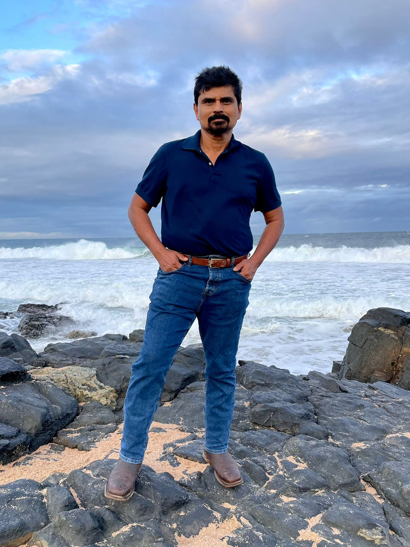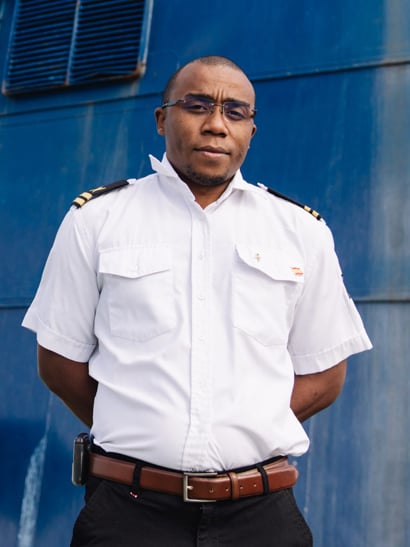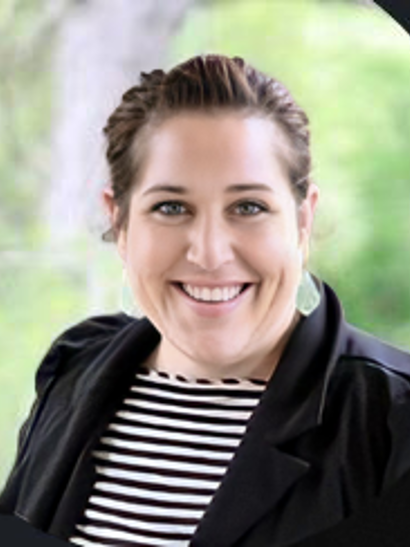For many, getting up for work every day, knowing that you’re making a positive difference in the world is the goal. For the people at Mercy Ships, there is a shared mission as they spend their working lives as part of an incredible team that helps to save lives.
In short, the people at Mercy Ships are mobile life-changers. The global charity is an international development organisation that deploys hospital ships to some of the poorest countries in the world, delivering vital, free healthcare to people in desperate need.
Worldwide, 5 billion people lack access to safe, affordable and timely surgery. Many of these people live in countries where the healthcare infrastructure is limited or non-existent, or where there’s a shortage of trained healthcare providers. More than 44% of the world’s population lives within 100 miles of a coast, which is why Mercy Ships uses modern hospital ships to provide access to free medical care.
The charity aligns with LR's social purpose mission – working to make the world a safer place. Thanks to LR’s partnership with Mercy Ships, which spans more than 40 years of co-operation, both organisations have been able to work together to build hospital ships and share skills to work on them safely, so the Mercy Ships team can take to the seas and save lives.
Spending some time with a few of the team members, it’s clear that every role is integral to quite literally keep the ship running.
Meet Ananda Samaraweera, Technical Superintendent
With a background in marine engineering and raised in Sri Lanka, Ananda Samaraweera was motivated to join Mercy Ships due to the organisation's commitment to helping people who are most in need. He has served on Africa Mercy® and worked in multiple locations with Mercy Ships. His technical expertise means that the engines keep running, the generators keep working and the hospital equipment on the ship is ready for use. For Samaraweera, one of the main attractions of working for Mercy Ships is encountering people from many parts of the world.
"There are so many languages spoken onboard. We have 29 positions in our department and at one point we had 16 nationalities from many parts of Europe, North and South America, South and West Africa as well as Madagascar," he tells Horizons.
It's the way people onboard can pull together and keep calm in a crisis that makes the Mercy Ships team different, he said. "One day our generator went out. We had a blackout. We needed to get the power back to normal and through working together, we worked out that it was a simple cable issue that was easily solved thanks to a moment of calm – and also prayer. Within 10 minutes, we were back to normal power."
Samaraweera also explained that he trains local people, and some go on to work for Mercy Ships, with opportunities for further courses to help them to become qualified engineers or obtain other licenses.
One particular occasion that stands out in his mind is when he helped someone in the local community: "After working hours one day, we visited a church and there was a lady afflicted with a swollen stomach – we learnt that it was a life-threatening tumour. After some discussion, we were able to bring the lady onboard who was then treated by a doctor. The tumour, when removed, was 17kg. I understand that it’s one of the biggest tumour that Mercy Ships doctors have ever removed. She is now well and sharing her story!
"Mercy Ships has opened a door for me, to come and work alongside them and their mission. I am very grateful for the founders, my managers, my team," he concludes.

“People are people, wherever you go. Whichever culture you come from, whatever language you speak. The bottom line is that we are all the same.”

Meet Robert Randriamanantena, Africa Mercy Purser
Robert Randriamanantena is a civil engineer who has worked for Mercy Ships for almost 10 years. He learned about Mercy Ships following news being shared at his church. His role now focuses on immigration and customs for those who work onboard – helping to get visas and paperwork agreed amongst other duties. Working with over 45 nationalities, Randriamanantena helps the team get to the ship and home again.
He tells Horizons how much it means for local communities when Mercy Ships calls at a nearby port. "It’s popular. Even on social media all around the city, they’re talking about it wanting to know when it’s coming."
He continued: “When you work with Mercy Ships it’s a community of faith, but you still have a job to get done. The work everyone does is so different, but everyone works together.”
It means a lot to Randriamanantena to work for Mercy Ships. He tells Horizons: “For me, if we are not doing our paperwork in the right way, the doctors cannot do the surgery and provide care. While we don’t interact with the patients, it’s good to know that we did something to help them because we kept the ship going.”
“I really enjoy it; it’s given me so much experience working with so many nationalities and customs agents in different places.”
Meet Tracey Bartula, Senior Operations Staffing Specialist
Having worked around the corner from the Mercy Ships office for years, USA-based Tracey Bartula joined Mercy Ships in 2008. She now oversees the team that brings people onboard to fill technical marine operations positions and other roles that are non-medical.
When asked what attracted her to working at Mercy Ships, Bartula said: "I’m very driven by just finding purpose in my work. I love being part of something that's bigger than me and part of something so important – even just our day-to-day. Often we get to learn about a story from a patient on one of our ships – the team are saving lives and I get to be a part of that all the way from Texas."
She continued, talking about the impact she makes day-to-day: "I staff the technical crew and not the surgeon, for example, the people who run the ship operationally. It’s important to me, because I make sure there is a captain onboard to make that surgery happen. Because if the ship didn't operate, neither do the operating rooms on the ship."
Bartula explains how her work doesn't always pay off at the time. "I used to be a part of the [Mercy Ships] global career events team,” and in 2014, received an application saying they had met Bartula six years previously at an event, and that only now did they feel the "timing was right" to embark on a career with Mercy Ships.
Sometimes people respond straight away, with applicants – touched by the work of Mercy Ships – able to re-organise their lives to volunteer at short notice. She says that it either way, “we need people to serve onboard,” and that many people are "organising their lives with the same purpose and goal in mind."

“It is such a wonderful organisation to work for. There's nothing quite like it in the world. It's so unique in what it does. It's fulfilling.”
What is clear is the shared sense of purpose and responsibility that came from the three members of the Mercy Ships team interviewed by Horizons. Whether they’re on the ship – working with LR’s technical experts – in the ports, or in the office, they’re helping to save lives every day.
You can find out more about LR's corporate sponsorship of Mercy Ships below:
LR and Mercy Ships






